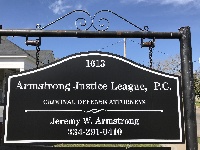Phenix City Felony Lawyer, Alabama
Not enough matches for Phenix City Felony lawyer.
Below are all Phenix City Criminal lawyers.
Jeremy W. Armstrong
✓ VERIFIEDCriminal, Felony, Misdemeanor, DUI-DWI, State Appellate Practice
"A Criminal & D.U.I. Defense Law Firm"
I have spent my entire legal career in the criminal justice system as a former prosecutor and a criminal defense attorney since October 2000. In Apri... (more)
Connie Jo Cooper
Wills & Probate, Divorce & Family Law, Criminal, Medical Malpractice
Status: In Good Standing Licensed: 32 Years
FREE CONSULTATION
CONTACTJames Robert Mckoon
Divorce & Family Law, Criminal, Personal Injury, Accident & Injury
Status: In Good Standing Licensed: 47 Years
Ralph Michael Raiford
Accident & Injury, Criminal, Estate, Traffic
Status: In Good Standing Licensed: 46 Years
Richard Ladonne Cross
Divorce & Family Law, Criminal, Business, Bankruptcy & Debt
Status: In Good Standing Licensed: 28 Years
Richard Lee Chancey
Divorce, Criminal, Business, Accident & Injury
Status: In Good Standing Licensed: 30 Years
Eric Barbee Funderburk
Family Law, Divorce & Family Law, Criminal, Bankruptcy & Debt
Status: In Good Standing Licensed: 29 Years


